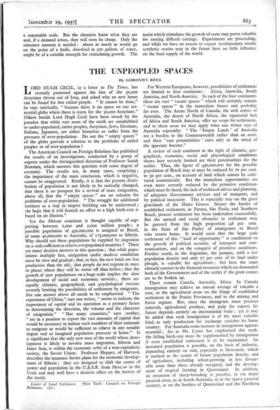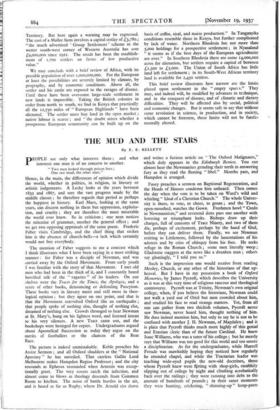THE UNPEOPLED SPACES
By GORONWY REES
LORD HUGH CECIL, in a letter to The Times, has recently protested against the fate of the 30,000 Assyrians driven out of Iraq, and asked why no new home can be found for this exiled people. " It cannot be done," he says satirically, " because there is no space on our ter- restrial globe where there is room for the 30,000 Assyrians." Others beside Lord Hugh Cecil have been struck by the paradox that while vast areas of the earth are uninhabited or under-populated, entire peoples, Assyrians, Jews, Germans, Italians, Japanese, are either homeless or suffer from the pressure of over-population. Do not, the " empty spaces " of the globe provide a solution to the problems of exiled peoples or of over-population ?
The American Council on Foreign Relations has published the results of an investigation, conducted by a group of experts under the distinguished direction of Professor Isaiah Bowman, which answers this question with some degree of accuracy. The results are, in many cases, surprising ; the importance of the main conclusion, which is negative, cannot be exaggerated. Briefly, it is that the present distri- bution of population is not likely to be radically changed, that there is no prospect for a revival of mass emigration, above all, that the " empty spaces " are no solution for problems of over-population. " The struggle for additional territory as a- step in empire building can be understood ; the hope that it will furnish an offset to a high birth-rate is based on an illusion."
Yet the African continent is thought capable of sup- porting between i,000 and 2,000 million people ; a possible population of 430,000,000 is assigned to Brazil, of some 40,000,000 to Australia, of 173,000,000 to Siberia. Why should not these populations be supplied by migration on a scale sufficient to relieve overpopulated countries ? There are many decisive answers to this question ; that while popu- lations multiply fast, emigration under modern conditions must be slow and gradual; that, in fact, the new lands are less productive than the old; that people do not migrate in mass to places where they will be worse off than before ; that the growth of new populations on a huge scale implies the slow development of social and economic services ; there are equally climitic, geographical, and psycholOgical reasons severely limiting the possibilities of settlement by emigrants. But one answer above all needs to be emphasised. " The experience of China," says one writer, " seems to indicate the importance of capital and its operation as a primary factor in determining the direction, the volume and the- character of emigration." " Not many countries," says another, " are in a position to export the vast amounts of capital that would be necessary to induce such numbers of their nationals to emigrate as would be sufficient to relieve in any notable degree real or imagined population pressure at home." It is significant that the only new area of the world whose deve- lopment is likely to involve mass migration, Siberia and Inner Asia, is within the economic orbit of a non-capitalistic society, the Soviet Union. Professor Hopper, of Harvard, describes the immense Soviet plans for the economic develop- ment of Siberia ; they are designed to shift the centre of power and population in the U.S.S.R. from Moscow to the Urals and may well have a decisive effect on the history of the world.
Limits of Land Settlement. (New York: Council on Foreign Relations. Isi.) For Western Europeans, however, possibilities of settlement are limited to four continents : Africa, Australia, South America, and North America. In each of the four continents there are vast " vacant spaces " which will certainly remain " vacant spaces " in the immediate future and probably for ever. The Arctic North of Canada, the arid centre of Australia, the desert of North Africa, the equatorial belt of Africa and South America, offer no scope for settlement, and to these areas we may apply what one writer says of Australia especially: " The ' Empty Lands ' of Australia are a burden to the Commonwealth rather than an asset, and their ' vast potentialities ' exist only in the mind of the ignorant booster."
A review of each continent in the light of climatic, geo- graphical, economic, social and physiological conditions shows how severely limited are their potentialities for the settler. Thus, the figure of 430,000,000 for the possible population of Brazil may at once be reduced by 20 per cent. to 3o per cent., on account of land which cannot be culti- vated economically. But the immediate opportunities are even more severely reduced by the primitive conditions which must be faced, the lack of technical advice and planning, of adequate Government services and of transport, and by political insecurity. This is especially true on the great grasslands of the Matto Grosso. Nearer the border of established settlement, in Parana, Sao Paulo, and Southern Brazil, pioneer settlement has been undertaken successfully, But the natural and social obstacles to settlement may be guessed from the high proportion (48 per cent. in the State of Sio Paulo) of immigrants to Brazil who return home. It would seem that the large scale settlement of this " land of opportunity " is conditional on the growth of political security, of transport and com- munications, and on the conquest of primitive conditions. Further south, in the Argentine, the pampas, with a low population density and only 27 per cent. of its land under plough, is suitable for agriculture ; but here the main obstacle consists in the financial resources which are demanded both of the Government and of the settler if the great estates are to be broken up.
There remain Canada, Australia, Africa. In Canada immigration may achieve an annual average of ioo,000 a year, to the agricultural areas on the fringe of established settlement in the Prairie Provinces, and to the mining and forest regions. But, since the immigrant must produce minerals, agricultural produce, and pulp for export, his future depends entirely on international trade ; yet it may be added that such immigration is of the most valuable kind, as only production for exchange enriches his home country. For Australia some increase in immigration appears essential ; for, as Mr. Lyons has emphasised this week, the falling birth-rate must be supplemented by immigration if even established settlement is to be maintained. An increased population is possible, on the basis of industry, depending entirely on coal, especially at Newcastle, which• is marked as the centre of future population density, and of agriculture, including wheat-growing in less favour- able areas than those already occupied, and the develop- ment of tropical farming in Queensland. In addition, an extension of sheep-breeding is possible, in the dense pastoral areas, as in South Australia, or in the sparse pastoral country, as on the borders of Queensland and the Northern Territory. But here again a warning may be expressed. The cost of a Mallee farm involves a capital outlay of £3,78a; " the much advertised ' Group Settlement ' scheme in the wetter south-west corner of Western Australia has cost £9,000,000 since 1921. The result has been the establish- ment of 1,70o settlers on farms of low productive value."
We may conclude with a brief review of Africa, with its possible population of over r,000,000,000. For the European at least the possibilities are severely limited by climate, by geography, and by economic conditions. Above all, the settler and his cattle are exposed to the ravages of disease. Until these have been overcome large-scale settlement in new lands is impossible. Taking the British colonies in order from north to south, we find in Kenya that practically all the 12,750 miles of " European Highlands " have been alienated. The settler must buy land in the open market ; native labour is scarce ; and " the doubt arises whether a prosperous European community, can be built up on the basis of coffee, sisal, and maize production." In Tanganyika conditions resemble those in Kenya, but further complicated by lack of water. Northern Rhodesia has not more than 5,000 holdings for a prospective settlement ; in Nyasaland " it seems as if the best days of the European agriculturist are over." In Southern Rhodesia there are some 14,000,000 acres for alienation, but settlers require a capital of between £1,500 to £5,000. The Union of South Africa has little land left for settlement ; in its South-West African territory land is available for 2,450 settlers.
This brief review illustrates how narrow are the limits placed upon settlement in the " empty spaces." They may, and indeed will, be modified by advances in technique, and in the conquest of disease, and of climatic and dietary difficulties. They will be affected also by social, political and economic changes. But it seems safe to say that without some revolution in science, in production, and in society, which cannot be foreseen, these limits will not be funda- mentally altered.

















































































































 Previous page
Previous page